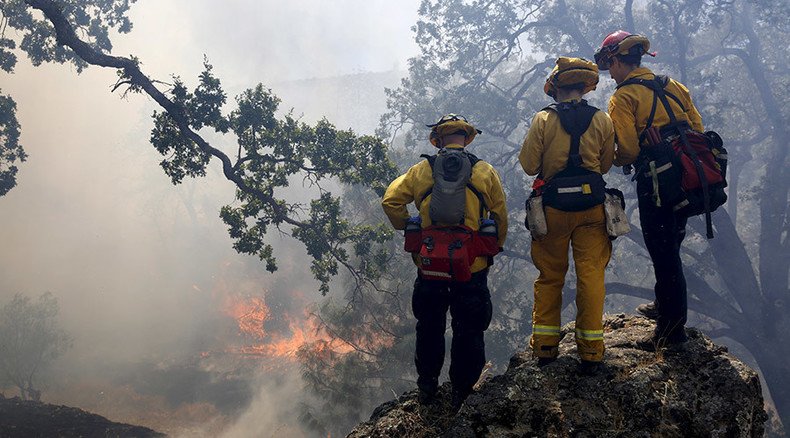4,000 California prisoners are fighting wildfires for a pittance

A shocking number of firefighters battling California’s numerous wildfires are actually prisoners sometimes working for less than $2 a day. They’re hoping to earn shorter sentences – and they’re saving taxpayers tens of millions of dollars.
Somewhere between 30 to 40 percent of the state’s forest firefighters, or nearly 4,000 people, are low-level felons from state prisoners, Mother Jones reported. Working in “Conservation Camps” set up by the California Department of Corrections and Rehabilitation (CDCR), the inmates are trained to clear brush that can potentially trigger a fire and also battle the flames when a blaze does occur.
In return, they make somewhere between $1.45 and $3.90 per day, according to the CDCR. They also have two days knocked off of their sentences for every day they work.
Speaking with KQED, inmate Cory Sills said that, despite sometimes having to work 24-hour shifts, he generally feels like the camps are a good thing, especially since prisoners are treated better than they are behind bars.
“There’s an assembly where we have a formation in the mornings and it was like my second or third day and the lieutenant comes out and he goes, ‘Look, we’ll treat you like men first, firefighters second, and prisoners if we have to,’” he said last July. “That right there, that stuck in my head for two years now because now I have a chance to be treated like a man.”
Prison reforms attempt to tackle high recidivism rate, get former convicts hired http://t.co/O3YXQn2sdjpic.twitter.com/l0AlEb24iD
— RT America (@RT_America) August 15, 2015Another inmate, Michael Dignan, is now close to being released after four years of working as a firefighter. He said there are upsides to the job besides not having to sleep in prisons, which no inmate has to do after being accepted into the program. Prisoners, instead, sleep in barracks-style lodges that are guarded by correctional officials and even get better food.
For California taxpayers, the cheap labor amounts to more than $80 million in savings per year.
Still, not everyone thinks the program is ideal, especially since the work can potentially be very dangerous. When wildfires are fought by inmates, the prisoners are putting themselves at risk against huge flames.
“When the inmates volunteer, we don’t try to hide that fact [that it’s dangerous],” CDCR spokesman Bill Cessa told ThinkProgress. “When you’re actually in a fire — this is not a small grass fire, these are fires with flames 100 feet tall.”
‘Jaw-dropping’ California wildfire forces 12,000 locals to evacuate (PHOTOS, VIDEO) http://t.co/cSZSweHYbQ
https://t.co/UXL3NXualU
— RT America (@RT_America) August 3, 2015Prison reform advocates have also shared concerns because officials have expressed reluctance to go ahead with early-release programs for fear that they would significantly reduce the number of inmates left to volunteer as firefighters.
In 2014, California state attorneys stated that implementing an early-release program would “severely impact fire camp participation – a dangerous outcome while California is in the middle of a difficult fire season and severe drought.”
Shortly afterwards, California Attorney General Kamala Harris relaxed this policy. Now, minimum-custody inmates can be considered for early release unless it can be proven that the number of firefighters would be reduced by doing so, Mother Jones stated.
Thrilling body cam footage shows firefighters battling raging fire http://t.co/R1PxrFdIyWpic.twitter.com/Ls5DgzyeFK
— RT America (@RT_America) August 4, 2015One troubling comparison was also made in a 2014 Buzzfeed article, this time to slavery. Of the 45 inmate firefighters interviewed by Toronto sociologist Philip Goodman, 10 referred to their time in the camps as “slavery,” while seven referred to it as “rehabilitation.”
“Pshh, this might be beyond slavery, whatever this is,” inmate Demetrius Barr told Buzzfeed. “They don’t have a whip. That’s the difference.”
Still, others have continued to find value in the program. There are no numbers to determine whether the firefighting camps reduce the rate at which inmates re-enter the criminal justice system as repeat offenders, but officials told KQED that they don’t personally see as many back in prison.
“This is a reward for many of these individuals,” California Department of Forestry and Fire Protection spokesman Daniel Berlant said to Mother Jones. “They’re outside the walls, doing good work, learning a skill that they may not get behind bars. They don’t want to screw up.”












